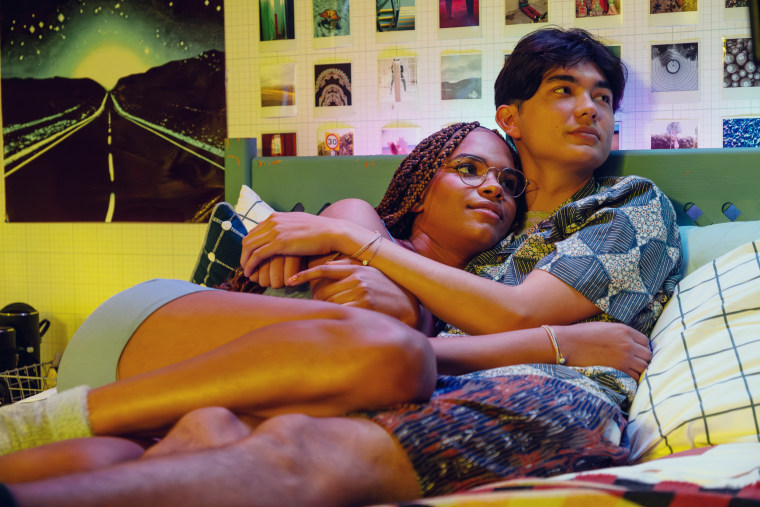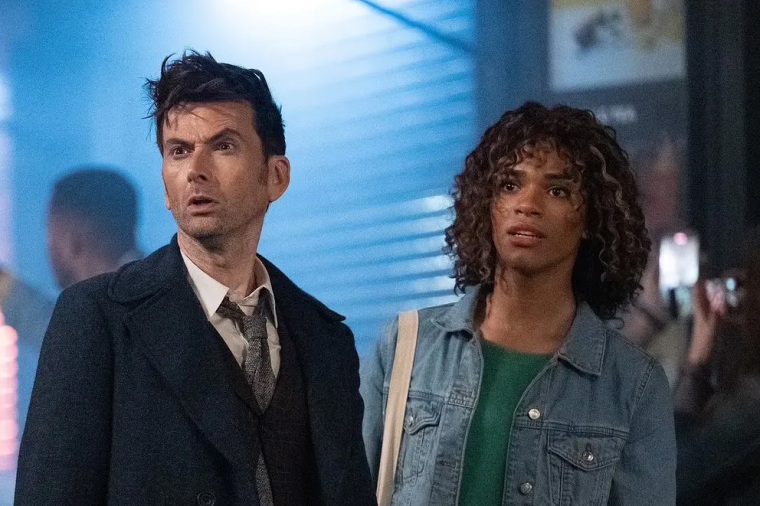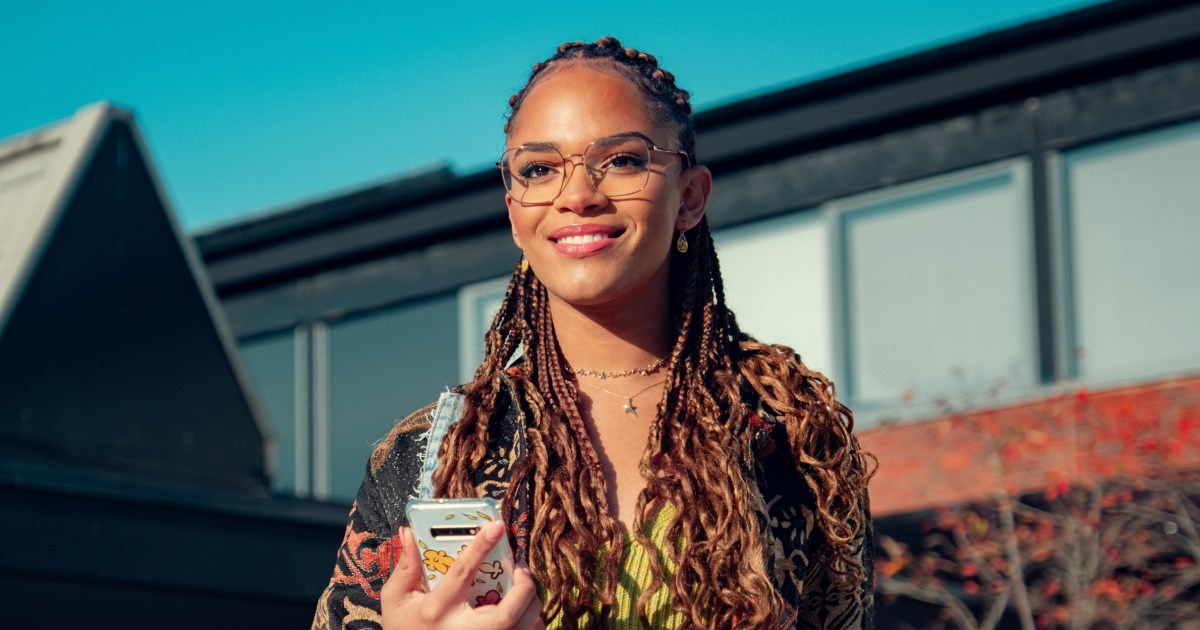When she first read the open casting call for Elle Argent, the Black transgender artist who lies at the heart of the beloved high school friend group in Netflix’s “Heartstopper,” Yasmin Finney could hardly believe her eyes. Having gained a social media following for documenting her own experiences as a Black trans teen growing up in the United Kingdom, Finney, like many of her followers who brought the casting notice to her attention, believed the role would be a perfect fit.
That would be just the first of many times in recent years that the stars would align for Finney, who — through her work on “Heartstopper,” which returns for its third season Thursday, and the new “Doctor Who” — has quickly become one of the most prominent trans people in the world. It’s a responsibility that weighs heavily on Finney, 21, who has been forced to wrestle with the thorny process of self-discovery in early adulthood under the public spotlight.
“I’ve really been lucky to have a trans character do so well and to get so much love and support. I think that’s quite rare to have that, but I feel quite protected with the ‘Heartstopper’ fan base,” Finney said on a recent video call from her flat in London. “I’m very blessed to have Elle enter my life almost three years ago now.”
When the hit coming-of-age series debuted in 2022, “Heartstopper” — based on Alice Oseman’s acclaimed graphic novels about two British teens (played by Joe Locke and Kit Connor) who fall in love at an all-boys school — introduced a newly transitioned Elle, who had just transferred to the local all-girls school. In the show’s third season, which largely explores the angst of first-time sexual experiences, Elle, now a student at an intensive arts school, wants to take her relationship with her boyfriend, Tao Xu (William Gao), to the next level, but that kind of intimacy forces her to confront — and confide in Tao about — her struggles with gender dysphoria.
“What ‘Heartstopper’ did so well in seasons one and two is it didn’t throw it in people’s faces of how bad it can be to be a trans person; it was a world of escapism and a world of fantasy. And this season, we get a taste of realism with Elle and what it can be like for trans people,” said Finney, who worked closely with Oseman to flesh out Elle’s story this season.
Finney, who also has gender dysphoria, said the idea of filming her first sex scene was “quite scary” and “overwhelming,” but she credits an intimacy coordinator for helping her and Xu discuss the importance of consent and making those moments “as natural and as realistic as possible, with the buzz and the beauty of being imperfect.” In the process, the show is able to offer another important example of a trans person in a loving, interracial relationship.

“When I step into the world of Elle, I always have this yearning for what she has, in the sense of that perfect relationship, that perfect unhinged love, which is just so gorgeous to watch. I don’t think it’s something that’s offered to a lot of trans people, especially not me when I was growing up,” said Finney, who grew up in poverty on a council estate — the British equivalent of the “projects” — in Manchester and was often bullied by her classmates for her flamboyance.
But more than anything else, Finney finds Elle and Tao’s relationship inspiring: “I get a vision of it’s possible to have this and to be represented in a positive light, and also I’m making change within the roles I’m playing, and that’s impacting people in the way it should.”
Finney has made a similar impact with her role in Russell T. Davies’ rebooted version of the BBC’s “Doctor Who,” which stars Ncuti Gatwa as the first Black title Doctor in franchise history. With her portrayal of Rose Noble, the daughter of fan-favorite companion Donna Noble (Catherine Tate), Finney became certainly the most notable trans character in the “Who” universe.
“I do think that being in a sci-fi world with such a heavy fan base can be also quite scary, but I think I was accepted quite well. Of course, there was some hate, I guess, when it came to the response of Rose and her transness,” she said.
Finney’s casting in the “Who” universe has drawn thousands of official and online complaints, but she is no stranger to weathering intense scrutiny about her identity.

“The key to that is you don’t respond; you don’t get into that world of negativity. It is keyboard warriors on their phone, with a box of KFC, who are just like, ‘Oh, I hate trans people,’” Finney said. “When people comment that stuff, it comes from a place of insecurities.”
Since she landed her role on “Heartstopper” at 17, Finney said, she has learned a number of invaluable lessons, including how to set her own boundaries and protect herself from those who don’t deserve her attention. At a time when trans rights are being targeted around the world, she said, she is learning to strike a balance between “being able to be an advocate” for her community “but also not losing the happiness and the joy” of being able to live life on her own terms.
“I’m just very sure of who I am, and I think that not many people are, so I think that maybe I can shock people or intimidate people or whatever,” Finney said of the self-confidence that emanates from her social media posts and interviews. “But I think within the world I live in, I need to remember that there’s a bigger picture than people’s thoughts. I’m trying to get my rights; I’m trying to live as a human being, like you and everybody else.”
In the latest season of “Heartstopper,” Elle is blindsided when a radio host, under the guise of interviewing her about her art’s going viral on social media, asks her to weigh in on political debates about trans rights. As her profile has risen, Finney has found herself in a similar position — and some of her views have evolved as she has gotten older.
For instance, Finney admitted she initially rebuked any suggestion that nontransgender actors should be allowed to play trans characters (and vice versa). But after only a few years in the industry, she has softened that stance, in part because she wants to break out of the typecasting that tends to plague trans actors.
“When I finished filming season three [of ‘Heartstopper’], I just really realized that the roles that I’m getting are mostly trans. I kind of had this yearning for a connection with another kind of role,” Finney said, noting that she is still looking for that particular part.
“It’s a very important thing that we remember, as an audience member, as journalists, as directors, as producers, as all of the big productions, that it’s acting. When you’re on set, you are there to play a role and to deliver a character,” she said. “I think the industry has its flaws within the inclusivity it gives to people. But I think when those walls drop and when the industry allows everyone to get involved, I don’t think there will be a conversation on who should play what role, because the roles will just be played by brilliant actors and actresses — and that is it.”
Finney said that looking ahead, she is “very excited” about the prospect of a fourth season of “Heartstopper,” which Oseman has already confirmed would be the show’s last. She would also “definitely want to come back for more episodes” of “Doctor Who,” and she hopes to dabble more in the sci-fi world. But as she awaits a potential return to the roles that have defined her career thus far, it’s clear that Finney, like her “Heartstopper” co-stars, already has her sights on even bigger things.
“My next goal in my career is to be able to play a role which doesn’t specify a trans identity but also that can just impact people in another way. Elle impacted a certain community, but I just want a role which will be able to impact everyone,” Finney said, adding that her ultimate goal is to win an Academy Award. “‘Heartstopper’ has had such a good response, and it makes me think that I can do anything.”

Leave a Reply